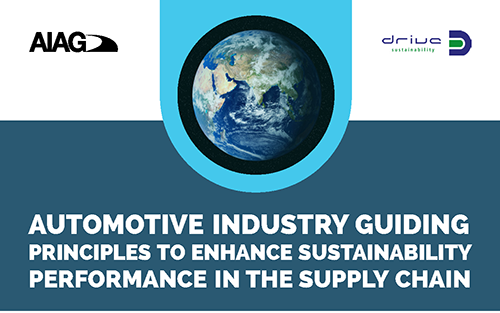
The UN Guiding Principles on Business and Human Rights are a set of guidelines for states and companies to prevent, address, and remedy human rights abuses committed in business operations. They were proposed by UN Special Representative on Business and Human Rights John Ruggie and endorsed by the UN Human Rights Council in June 2011. In the same resolution, the UN Human Rights Council established the UN Working Group on business & human rights.
The Guiding Principles are based on fundamental principles of social, environmental, and governance responsibility consistent with applicable laws and international standards. They outline the expectations of automotive companies towards suppliers on issues related to sustainability. With additional sections on circularity, carbon neutrality, animal welfare, biodiversity, land use, and deforestation, the revised Guiding Principles aim to address the latest trends and industry expectations for supply chain sustainability.
To fulfill the Guiding Principles, automotive suppliers should implement a management system — defined as a combination of policies, processes, functions, tools, and internal controls — that helps an organization control its operations, reach objectives, and ensure continuous improvement. The recommendations concerning the practical application of the Guiding Principles are outlined in the Practical Guidance document.
Based on the Guiding Principles, the Automotive Sustainability Practical Guidance provides a practical explanation of each expectation, as well as examples of actions suppliers could take to improve overall sustainability performance.
For example, the document outlines several examples of how to meet the expectations described in the Guiding Principles regarding Business Ethics, Environment, Human Rights and Working Conditions, Health and Safety, and Responsible Supply Chain Management.
With more thorough guidance overall and an approach that better highlights current industry guidelines and expectations, these updates were once again the result of extraordinary alignment between AIAG and Drive Sustainability plus automakers BMW Group, Daimler Truck, Ford Motor Company, General Motors, Honda, Jaguar Land Rover, Mercedes Benz, Nissan, Scania, Stellantis, Toyota Motor Europe, Volkswagen Group, Volvo Cars, and Volvo Group.
Be sure to update your files with the latest versions of these global documents today. Click here to download the Guiding Principles and the supplementary Practical Guidance.
The Next Decade
June 2021 marked the 10-year anniversary of the adoption of the UN Guiding Principles on Business & Human Rights (UNGPs) by the UN Human Rights Council. To mark this occasion, the UN Working Group on Business and Human Rights launched a new project to further drive and scale up implementation of the UNGPs more widely over the next 10 years. The project has two main components:
- Take stock of the first ten years of UNGPs implementation. This includes assessing progress, gaps, and challenges, as well as obstacles and opportunities for advancing more robust policy action and change in the coming years. This analysis was presented in a “stocktaking” report to the Human Rights Council on 28 June. Recognizing the important role of the financial sector as a driver for faster UNGP implementation, the general stocktaking report is accompanied by an addendum report focused on uptake by and recommendations for institutional investors and others in the investment community.
- The stocktaking was be followed by a “roadmap for the next decade”, with forward-looking recommendations for State actors and businesses, as well as other actors who have a role to play in promoting the implementation of the UNGPs. This roadmap was launched in the second half of 2021.
For more information on the work that is being done, click here.


